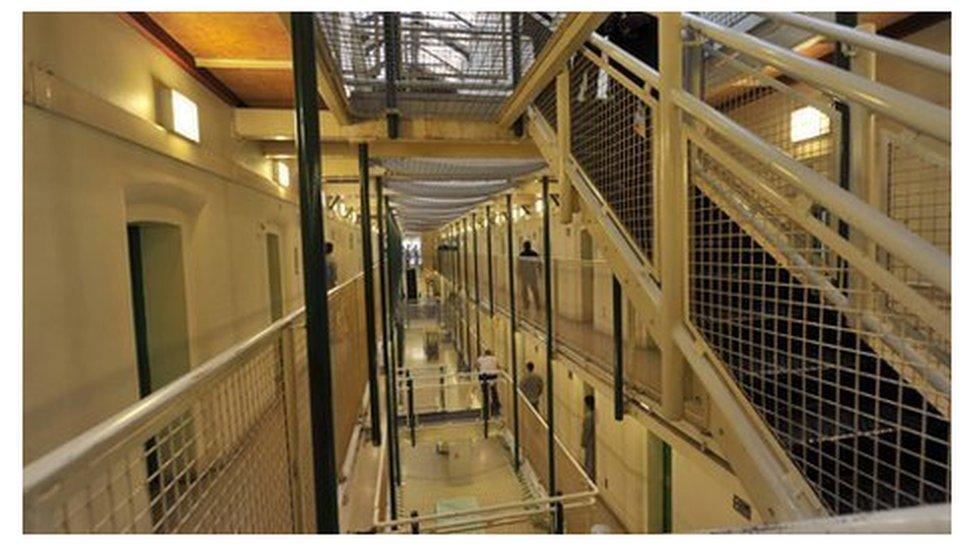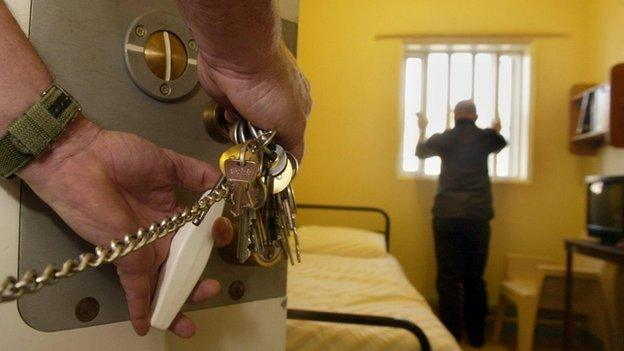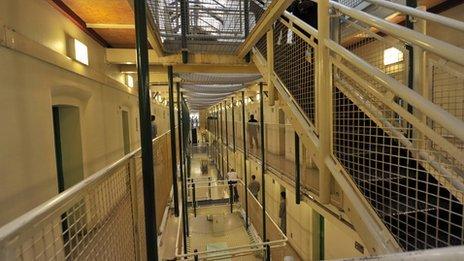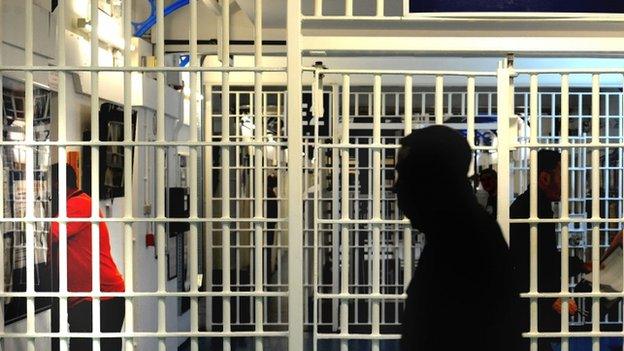Prison changes needed for older inmates, report suggests
- Published

Scotland's prison population is getting increasingly older
Changes are likely to be required to the prison estate to accommodate the growing number of inmates with social care needs, a new report has suggested.
Older prisoners, and those with disabilities, now make up a larger section of the prison population.
The rise is partly down to an increase in those being jailed for historical sex offences.
The Scottish Prison Service said in future those with social care needs may be treated as a "distinct population".
Former Justice Secretary Kenny MacAskill has said the SPS should consider establishing a separate facility for older people.
The new report by the prison service looked at the social care needs of prisoners in jails across Scotland. The aim is to use it as a research base to shape how these inmates are accommodated and supported in years to come.
Between 2010 and 2016, the number of men aged over 50 in Scotland's prison population rose by more than 60%, from 603 to 988.
The number of men in prison aged over 65 also increased in that period, from 88 to 148 - a rise of 68%. A rise was also seen in the number of women over 50 - from 26 to 33.

Kenny MacAskill has suggested a separate secure facility for older prisoners
These prisoners are more likely to have social care needs - such as requiring help with mobility or washing - and many would have been given that support in the outside community.
Many younger prisoners also need extra support for health needs - sometimes because their health has been damaged by drug addiction.
The report also pointed to the link between a prisoner's background and their need for social care, suggesting that those from deprived communities were more likely to require additional help to deal with ill health and disability.
It concluded: "With a population that is aging, a population drawn disproportionately from Scotland's most deprived communities and a population where almost a third describe themselves as having a disability or long-term health condition, the need for social care support, equipment and changes to the prison estate to accommodate the care of people in prison who have social care needs is likely to grow - alongside the associated costs."
Under the Public Bodies (Joint Working) (Scotland) Act, health boards and local councils work together to provide social care services.
The report said: "Different local authority areas and NHS boards are doing this in different ways. It is not yet clear how the provision and delivery of health and social care might change as a result of integration, nor what sort of regional variation may emerge."
It concluded that the prison service would need to work in "extensive partnership" with the NHS and councils to meet the future social care needs of prisoners, and it hinted at the possibility of separate accommodation and services specifically targeted at older prisoners and those with health and disability needs.

The SPS said there was case for treating those with social care needs as a "distinct population"
The report said: "The percentage of the Scottish prison population who require social care support is likely to increase in the years to come.
"There is a case to be made that this population in custody could be considered as a distinct population, with distinct needs - needs that will be affected by SPS, partner organisation and governmental policy."
Responding to the findings of the report, Tom Fox from the Scottish Prison Service acknowledged that Scotland's jails are not currently geared up to fully deal with prisoners with complex needs.
He said: "We have prison staff who are trained to deal with prisoners, NHS colleagues who are trained to provide health care but there is a gap in the middle for social care which we are currently having to fill with agency staff.
"The cost in the current year for those agency staff is something around a quarter of a million pounds."
Former Justice Secretary Mr MacAskill told BBC Scotland that establishing what would amount to a secure old-folks' home "may be the answer".
He said: "Prison officers aren't trained to deal with the needs of elderly prisoners, particularly those with dementia.
"There is also a practical problem of accommodating elderly and disabled prisoners. They can't be doubled up in a cell as they may have arthritis or other mobility problems preventing them from accessing a top bunk.
"And there's the need to keep older prisoners separate from the younger, more unruly elements of the prison population."
- Published16 March 2017

- Published25 October 2016

- Published28 October 2014
